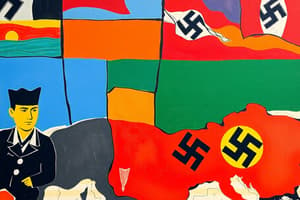Podcast
Questions and Answers
What were the two main groups at the core of World War I?
What were the two main groups at the core of World War I?
- Western Powers and Eastern Powers
- Allied Powers and Central Powers (correct)
- European Powers and Asian Powers
- Northern Powers and Southern Powers
Which event triggered the beginning of World War I?
Which event triggered the beginning of World War I?
- Assassination of Archduke Franz Ferdinand (correct)
- Signing of the Treaty of Versailles
- World Economic Crisis
- Discovery of a new continent
Which country declared war on Serbia after the assassination of Archduke Franz Ferdinand?
Which country declared war on Serbia after the assassination of Archduke Franz Ferdinand?
- Austria-Hungary (correct)
- Italy
- France
- Russia
Which type of warfare became prominent during World War I?
Which type of warfare became prominent during World War I?
What was one of the primary causes of World War I according to the text?
What was one of the primary causes of World War I according to the text?
Which country was NOT part of the Central Powers during World War I?
Which country was NOT part of the Central Powers during World War I?
What was one of the reasons suggested by historians as a cause for the start of World War I?
What was one of the reasons suggested by historians as a cause for the start of World War I?
How many soldiers died during the course of World War I?
How many soldiers died during the course of World War I?
What was a significant outcome of World War I in terms of states?
What was a significant outcome of World War I in terms of states?
What type of rule shifted towards as a result of World War I?
What type of rule shifted towards as a result of World War I?
What was one key aim of the numerous treaties signed after World War I?
What was one key aim of the numerous treaties signed after World War I?
How many old states disappeared by the end of World War I?
How many old states disappeared by the end of World War I?
Flashcards are hidden until you start studying
Study Notes
History of World War I
World War I was one of the most devastating conflicts in history, taking place from 1914 to 1918. It involved nearly all the countries of Europe and their colonies around the world. At its core were two major groups—the Allied Powers and the Central Powers. Among the Allied Powers were Britain, France, Russia, Italy, Japan, Romania, and Serbia; among the Central Powers were Germany, Austria-Hungary, Bulgaria, and Turkey. Many nations entered the war with varying motivations, including nationalism, colonial rivalries, and the expansionist policies of some European countries.
The conflict began when Archduke Franz Ferdinand was assassinated by a Bosnian Serb nationalist in Sarajevo in June 1914. This led Austria-Hungary to declare war against Serbia, which resulted in several other countries entering the war on both sides. The fighting took place mostly in Western Europe, where there had already been an arms race between several nations. Aerial bombing, chemical weapons, trench warfare, and submarine attacks became important factors during this period. One significant event occurred in August 1914, when German troops marched into Belgium and Luxembourg, leading to accusations of invasion, aggression, and violation of neutrality.
One of the primary causes of the war was imperial competition for power and resources. Some historians suggest that the war started because the powerful empires of the time wanted to expand their borders beyond what they could truly manage. As a result, many battles were fought over small pieces of land that would eventually become part of larger territorial gains. Another factor contributing to the start of World War I was the belief held by some leaders that another large conflict like the Crimean Wars needed to take place to maintain stability and prevent future clashes.
During the course of the war, 7 million soldiers died, and approximately 21 million more were wounded. By the end of the war, 15 new states emerged, while three old ones disappeared. There were also numerous treaties signed after the war to try to regulate international relations and avoid similar catastrophes happening again. In terms of the impact of World War I on global politics, it brought a shift towards democracy and away from autocratic rule. It is widely considered to have changed the political landscape of the world forever, and is often remembered for the horrors experienced by those who lived through it.
Studying That Suits You
Use AI to generate personalized quizzes and flashcards to suit your learning preferences.




